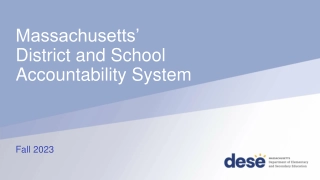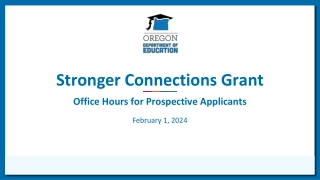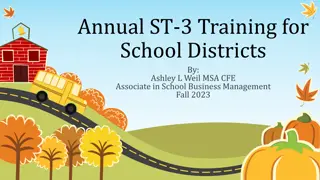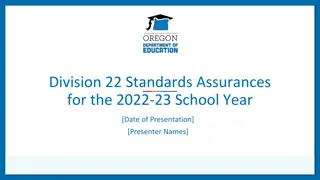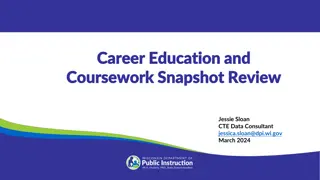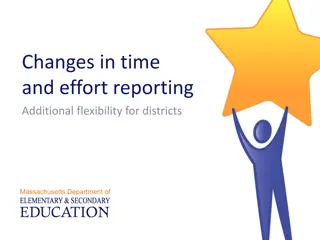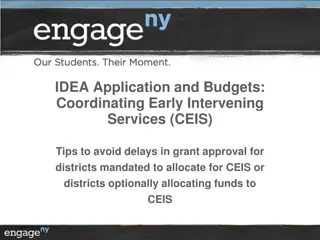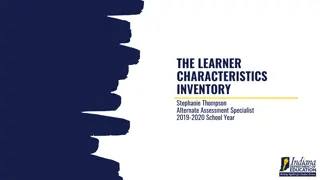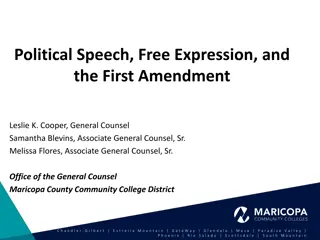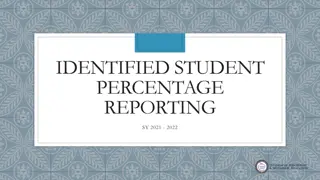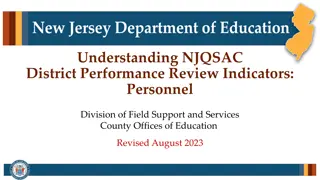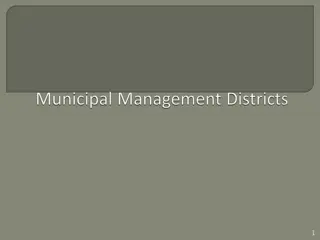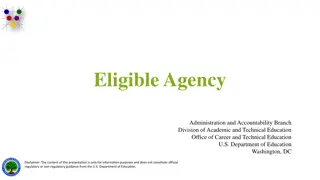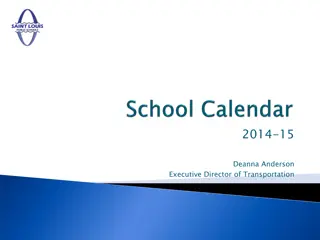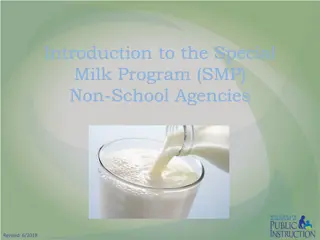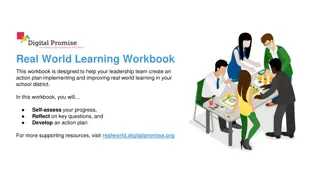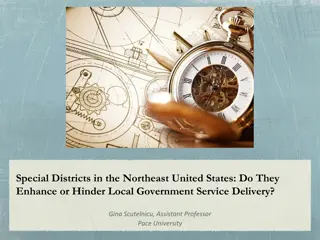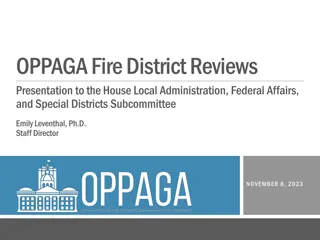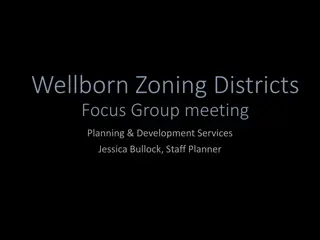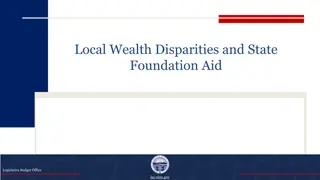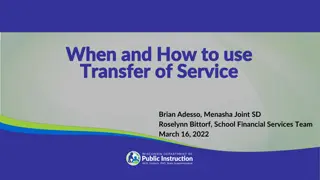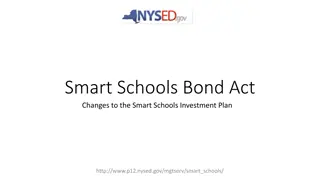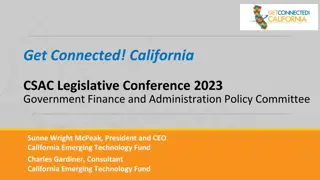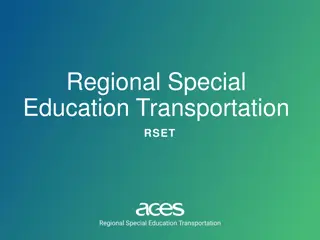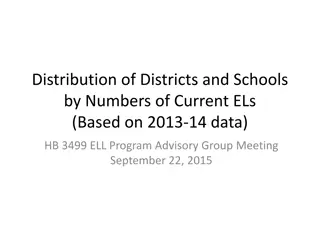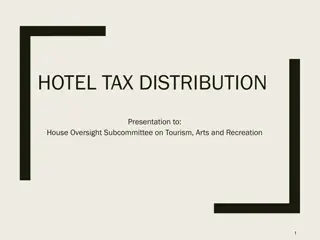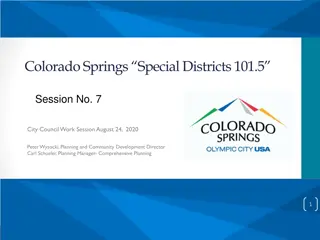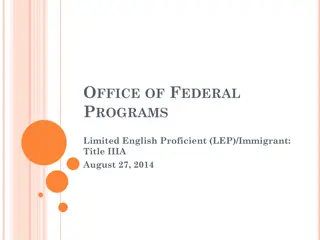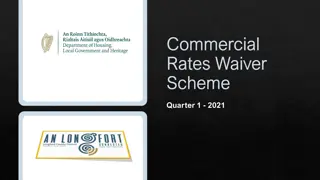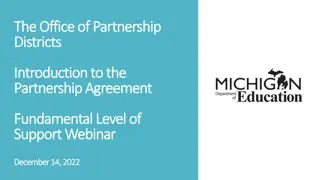Massachusetts District and School Accountability System Fall 2023
The Massachusetts District and School Accountability System for Fall 2023 includes various components such as Accountability Indicators, Normative Component, Criterion-Referenced Component, Assessment Participation, Categorization of Schools and Districts, and Reporting. It emphasizes measuring the
2 views • 32 slides
Elevating Student Voice for Safe Learning Environments Grant
This competitive grant aims to support Massachusetts public schools in elevating student voice to create safe, supportive, and healthy learning environments. The grant focuses on building the capacity of educators to engage effectively with students in ways that are developmentally appropriate, cult
1 views • 10 slides
Stronger Connections Grant
The Stronger Connections Grant information session aims to ground prospective grant applicants in the purpose and goals of the grant, review critical components of the Request for Application (RFA), and provide an overview of eligible districts and grant size. The session also emphasizes the importa
0 views • 23 slides
Special Education Circuit Breaker Program Overview FY2024
The Special Education Circuit Breaker Program for FY2024 provides financial assistance to public school districts for high-cost special education services. The program includes Relief Claims and Year-End Claims cycles, with legal references for reimbursement guidelines. Reserve Relief funds are avai
1 views • 27 slides
Insights from ASER 2023 Household Survey in Rural Districts
ASER 2023 focused on the age group 14-18 in rural districts, exploring domains beyond foundational skills like activity, abilities, and digital device skills. The survey reached 1,664 villages, surveyed 30,074 households, and 34,745 youth. Partners included colleges and universities, with over 2,000
0 views • 21 slides
Understanding NJQSAC District Performance Review Indicators
NJQSAC requires public school districts in New Jersey to complete a District Performance Review (DPR) comprising self-assessment tools measuring compliance with quality performance indicators in areas like instruction, fiscal management, governance, operations, and personnel. The District NJQSAC Com
0 views • 37 slides
Annual ST-3 Training for School Districts - GASB 96 Updates Fall 2023
This training program covers GASB 96 updates, General Fund Transfers, NRT updates, BOCES Expenditure Reporting, and filing ST-3 for school districts. GASB 96 focuses on Subscription-Based Information Technology Arrangements (SBITA), defining short-term and long-term contracts and how to account for
1 views • 76 slides
Comprehensive Overview of Ohio's 2023 Special Education Ratings
Ohio's 2023 Special Education Ratings assess the performance of local districts in implementing IDEA requirements, with categories ranging from Meets Requirements to Needs Substantial Intervention. The ratings, based on compliance data from the previous school year, include indicators such as timely
1 views • 21 slides
Division 22 Standards Assurances for the 2022-23 School Year Overview
The Division 22 Standards Assurances outline the requirements that Oregon school districts must meet to be considered standard. These standards cover various areas such as instructional time, state assessments, human sexuality education, counseling, student identification, credit options, suicide pr
0 views • 20 slides
Career Education Data Snapshot Review Guidelines
Guidelines for reviewing and ensuring accuracy of Career Education and Coursework data in WISEdash for Districts before the December 10, 2024 snapshot. Instructions on team responsibilities, data flow process, and quality checks are provided. Utilize the Data Team to verify data in WISEdata Portal a
1 views • 21 slides
Streamlining Time and Effort Reporting for Districts
Enhancing flexibility in time and effort reporting for school districts, the U.S. Department of Education aims to simplify documentation requirements, reducing burden especially for fixed-schedule employees. This change is significant for staff managing federal funds, emphasizing accountability and
1 views • 18 slides
Coordinating Early Intervening Services (CEIS) in IDEA Applications: Tips for Efficient Grant Approval
Coordinated Early Intervening Services (CEIS) under IDEA address disproportionality in school districts by providing academic and behavioral support to K-12 students not identified for special education. Districts allocate 15% of their IDEA funds to CEIS if significant disparities in identification
0 views • 10 slides
Understanding Learner Characteristics Inventory in Alternate Assessment
Learner Characteristics Inventory (LCI) is a tool used to assess and describe students with significant intellectual disabilities participating in alternate assessments. The LCI covers eleven indicators including communication, language use, motor skills, and more. It helps districts ensure proper a
1 views • 20 slides
Understanding Political Speech and Electoral Rules in Community College Districts
Explore the legal boundaries surrounding political speech and resource usage in community college districts, emphasizing impartiality and education over election influence. Learn about the restrictions and implications of utilizing district resources for election purposes.
1 views • 30 slides
Identifying Student Percentage Reporting SY 2021 - 2022
Identified Student Percentage Reporting (ISP) is essential for districts to report the number of students identified through direct certification and categorical lists in eSchool. This report must be submitted by April 15, 2022, to comply with federal regulations. Understanding how ISP is calculated
1 views • 12 slides
Understanding NJQSAC District Performance Review Indicators
The NJQSAC District Performance Review (DPR) is a comprehensive process that assesses public school districts in five key areas: Instruction and Program, Fiscal Management, Governance, Operations, and Personnel. Districts must complete a self-assessment tool to measure compliance with quality perfor
0 views • 41 slides
Understanding Municipal Management Districts (MMDs) in Texas
Municipal Management Districts (MMDs) in Texas are special districts that are self-governed but require approval from the host municipality. They have the authority to provide infrastructure and approved service plans. MMDs can issue tax-exempt bonds, levy taxes, assessments, and impact fees, and pr
7 views • 21 slides
Eligible Agency in Career and Technical Education: Responsibilities and Coordination
The term "eligible agency" refers to a State board designated to oversee career and technical education administration. This board is responsible for developing and implementing State plans, consulting with stakeholders, and convening regularly to fulfill its duties. The eligible agency also adopts
1 views • 7 slides
School Calendars and Comparative Analysis for St. Louis Public Schools 2014-2015
Executive Director Deanna Anderson presented the 2014-15 school calendar, compared calendars from other districts, and sought public input. Meetings with staff and analysis of surrounding districts were conducted to finalize the academic schedule. Key dates from various school districts were outline
0 views • 8 slides
Louisiana Cultural Districts: Engaging Communities in Cultural Development
The Louisiana Cultural Districts program, under the Cultural Economy Initiative, aims to revitalize local communities by creating hubs of cultural activity. By building on cultural resources and promoting art and culture, the program benefits from increased occupancy, commerce, and community identit
2 views • 18 slides
Overview of SAPSASA Hockey Current State and Districts for Boys and Girls in 2015
SAPSASA Hockey in 2015 discussed the current state of the game, with detailed information on districts, teams, and age groups. It highlighted the need for growth and sustainability through collaboration with clubs and organizations. The document also outlined specific districts for boys and girls, e
0 views • 8 slides
Understanding the Special Milk Program (SMP): Eligibility, Reimbursement, and Requirements
The Special Milk Program (SMP) encourages milk consumption among children in care settings, administered by the Department of Public Instruction (DPI) in Wisconsin. Participating agencies receive federal reimbursement for milk served to eligible children. This program operates year-round for non-sch
0 views • 34 slides
Real World Learning Workbook for School Districts
This workbook is designed to assist leadership teams in creating an action plan to implement and enhance real-world learning in their school districts. It involves self-assessment, reflection, and action plan development. The vision, considerations, and action items for real-world learning are explo
0 views • 25 slides
Special Districts in the Northeast United States: Enhancing or Hindering Local Government Service Delivery?
Special districts in the Northeast US, independent units of local government, professionalize public service management. They have specialized functions, administrative and financial independence, and low political visibility. The study aims to develop a typology of multi-purpose special districts f
0 views • 12 slides
Special Fire District Performance Reviews Overview
Presentation on the OPPAGA Fire District Reviews detailing statutory requirements, research objectives, findings for individual districts, and recommendations for special fire control districts in rural areas. The performance reviews cover governance, service delivery, resource management, and more,
0 views • 34 slides
Wellborn Zoning Districts Focus Group Meeting
Wellborn Zoning Districts Focus Group Meeting involves planning and development services led by Jessica Bullock, Staff Planner. The districts discussed include Wellborn Estate and Wellborn Restricted Suburban, each with specific purpose statements and dimensional standards. Wellborn Estate focuses o
0 views • 11 slides
Understanding the Truth about Districts and Homeownership Risks
Debunking common misconceptions about districts, this discussion sheds light on the limited obligations and protections for homeowners. It explains how districts provide financial viability and transparency, showcasing the intelligence of homeowners in evaluating their choices.
0 views • 11 slides
Understanding Collective Bargaining in School Districts
Collective bargaining in school districts involves negotiating over mandatory and permissive subjects such as wages, hours, and conditions of employment. School districts must differentiate between mandatory and permissive subjects, and disputes over mandatory subjects must be resolved through impas
0 views • 29 slides
Addressing Local Wealth Disparities in Ohio's School Funding
School districts in Ohio experience significant variations in property values, affecting their ability to generate local revenue. The state's school funding formula aims to neutralize the impact of local property wealth on educational opportunities by providing more aid to lower-wealth districts. Th
0 views • 5 slides
Understanding Transfer of Service (TOS) in Wisconsin School Districts
Transfer of Service (TOS) in Wisconsin school districts involves the transfer of financial responsibility from a local municipality to a school district, allowing for exemptions to revenue limits. Eligibility requirements include being within the application timeline and having students come from ot
0 views • 36 slides
Changes to Smart Schools Investment Plan
The Smart Schools Bond Act has brought changes to the Smart Schools Investment Plan, including new requirements for nonpublic educational technology loans and updates to sections concerning school connectivity and classroom learning technology. Districts are now required to differentiate loanable an
0 views • 23 slides
California Affordable Connectivity Program (ACP) Initiative Overview
The California Affordable Connectivity Program (ACP) aims to bridge the digital divide by providing eligible households with high-speed Internet services. This initiative offers assistance to low-income individuals through various eligibility requirements and identity verification processes. With fo
0 views • 20 slides
Teacher Salary Comparison in Fayette County vs. Jessamine County School Districts
This slide provides a comparison of teacher salaries in Fayette County and Jessamine County School Districts for different education levels and years of experience. It highlights the differences in pay scales between the two districts, showcasing the earning potential for teachers at various stages
0 views • 4 slides
Regional Special Education Transportation (RSET) Program Overview
RSET, which stands for Regional Special Education Transportation, is an initiative developed by ACES to help districts save money while safely transporting students to out-of-district placement sites. The program benefits districts by reducing transportation costs, addressing parent concerns, and ma
0 views • 13 slides
Analysis of EL Numbers in Oregon Schools and Districts
This analysis, presented during the HB 3499 ELL Program Advisory Group Meeting, highlights the distribution of Oregon districts and schools based on the number of current English Learners (ELs). It emphasizes the importance of considering EL numbers in identifying low-performing institutions and dis
0 views • 4 slides
Hotel Tax Distribution Overview for House Oversight Subcommittee
Hotel Tax Distribution presentation covers changes in hotel tax distribution, including how it is distributed, what is taxed, and the shared regional districts in Rhode Island. It details the breakdown of occupancy taxes, state funds distribution, and the impact on various municipalities and tourism
0 views • 17 slides
Comprehensive Overview of Colorado Springs Special Districts Work Sessions
Delve into the detailed sessions held by the Colorado Springs Special Districts on various topics including district accountability, transition of governance, dissolution, and more. Learn about the progression from prior sessions to the latest updates on mill levies, taxable status, and property ass
0 views • 19 slides
Federal Programs for Limited English Proficient (LEP) Immigrant Children and Youth
This document outlines the procedures and requirements for subgranting funds under Title III-A for Limited English Proficient (LEP) immigrant children and youth. It covers subgranting procedures, allowable expenditures, claiming reimbursement procedures, and annual reporting guidelines. Districts mu
0 views • 25 slides
Commercial Rates Waiver Scheme for First Quarter 2021
In Quarter 1 of 2021, a Commercial Rates Waiver Scheme has been introduced by Longford County Council to provide a 100% credit in lieu of commercial rates for eligible businesses impacted by COVID-19 restrictions. The waiver applies to specified categories of businesses for a three-month period with
0 views • 7 slides
Introduction to Partnership Agreement Fundamentals in Districts - Webinar on December 14, 2022
In this webinar, explore the key components of partnership agreements within districts. The Office of Partnership Districts introduces liaisons and outlines support levels, roles, and expectations. The model and coverage areas, including benchmarks and outcomes, are discussed. Additionally, details
0 views • 48 slides
